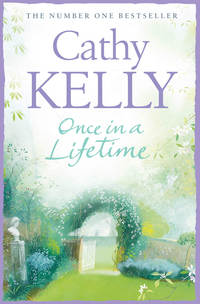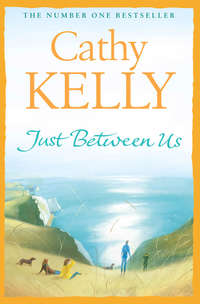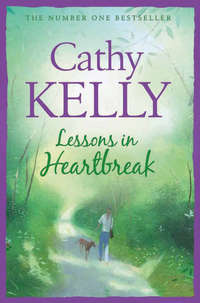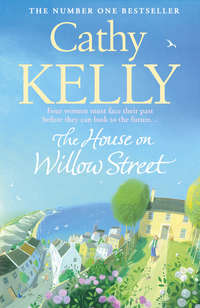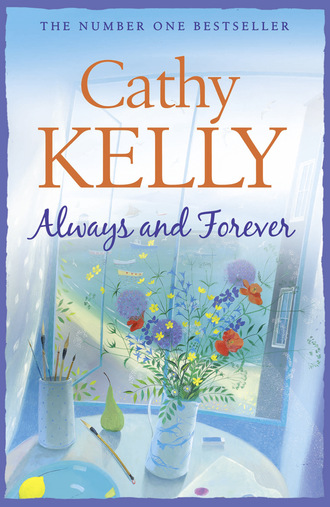
Полная версия
Always and Forever
Cleo didn’t have to exert her imagination to figure out what any self-respecting guest’s reaction would be if they’d travelled in the cold evening to the Willow, hoping for warmth and welcome, to be greeted by all this. The place was only missing Bela Lugosi with extra sharp incisors to complete the atmosphere. Before she’d gone to college, before she’d spent work experience summers in other hotels, Cleo had thought that their hotel was the finest around. Creaking water pipes, quaint hot-water bottles for guests’ bedrooms in winter and beautiful rugs with papery thin edges were part of an old hotel’s attractions. Its charm had also come from the love and warmth her parents had put into it, charm that meant more than any new furnishings or thick carpets. Harry Malin’s warmth was as much a part of the Willow’s success as the sense of faded elegance in a world of monotone, identikit hotel chains. But the balance between her father’s warmth and the state of the house had shifted.
Now she saw the Willow with new eyes. The hotel was tired, a dump. It badly needed a total revamp.
‘Hello!’ yelled Cleo into the empty hall.
Tamara, the hotel’s part-time receptionist, poked her head out from behind a tiny gap in the office door, the door that was supposed never to be shut. Small and very blonde, like her elder sister, Sondra, Cleo’s sister-in-law, Tamara had the air of one who always had something better to do than talk to you.
She wasn’t too keen on Cleo, mainly because Cleo was one of those people who never wanted to sit still. Tamara liked sitting still when there was nothing she felt inclined to do. Even better, she liked working on her nails. The acrylics had been too expensive, so she’d got rid of them and it was hard work getting her nails back into condition again. You really needed to rub nail conditioner in every hour religiously.
‘Yeah, hi,’ Tamara muttered, from where she sat, and went back to reading her magazine carefully so as not to dampen the pages with fingers slick with nail oil.
Cleo counted to ten. Then she went to twenty to be on the safe side. Screaming at staff was generally not encouraged in hotel management. But Tamara was not Cleo’s idea of a proper hotel receptionist, even if she was ‘almost family’, as Barney put it.
In the grand tradition of keeping the business in the family, Barney’s wife, Sondra, used to work as receptionist on a part-time basis, but now that she was pregnant, albeit only just, with the first grandchild of the Malin dynasty, she had given up work and her sister had been drafted in as her replacement.
Cleo had been all for hiring someone new but, no, family had to come first.
‘Cleo, come on, charity begins at home and all that. Tamara’s a bit low since she lost that job in the beauty salon,’ Barney had said. ‘And it’s not as if you need much experience for reception.’
That, Cleo decided, was what was wrong with her brothers. They didn’t understand the finer points of running a hotel. In Barney’s view, any idiot who could do long multiplication and say ‘Reception, how can I help you?’ could operate a successful hotel.
‘Barney, you do need experience for reception,’ Cleo said in exasperation.
‘Ah, Cleo, she’ll be great,’ wheedled Barney.
He had such an engaging smile, like Cleo’s but with an added hint of rogue thrown in for good measure. It was hard to resist.
‘Where is everyone, Tamara?’ asked Cleo brightly now so that Tamara would hear her through the half-closed office door.
‘Your mother’s in the kitchen and your father’s out.’
And there’s nobody on reception in case a guest comes in, Cleo thought. The hotel didn’t have a receptionist on all day; they couldn’t afford to. Tamara was employed for times of the day when Harry or Sheila were busy elsewhere.
Cleo was heading for the door that separated the reception from the kitchen when the office phone rang sharply.
After five interminable rings, Tamara picked it up.
‘Helloo, the Willow Hotel, how can I help yoou?’ she intoned in the special voice she used only for the phone or talking to rich guests.
Tamara would have to go, Cleo decided. Family or no family. Because if she didn’t go, Cleo would end up being arrested for hitting Tamara over the head with Tamara’s cosmetic-filled Burberry handbag. Also not generally encouraged in hotel management.
Cleo’s mother, Sheila, sat in the tiny alcove in the kitchen where an old church pew had been wedged in and covered with cushions so that people rushing around cooking and serving could take a rest and a cup of tea out of everyone’s way. The pew was of worn oak and the cushions looked like a multi-coloured bric-a-brac display with two scruffy rose velvets lined up with a scratchy oatmeal barrel cushion, a few threadbare tapestry cushions and a toile de Jouy confection that was faded to nothing. All had once been somewhere else in the hotel and had ended up in the kitchen when they were too old and shabby to be in the public domain. A small card table covered with a floral oilcloth sat in front of the pew and it was there that Cleo had done much of her homework, working patiently away with sums and French verbs while her parents spun past as they cooked and cleaned.
‘A good hotel-owner needs to be able to cook if the chef doesn’t turn up,’ Cleo’s father always said. And Harry Malin could certainly cook. In the early days, it was from him that Cleo had learned her love of the business – and her skill with people. Dad just had that way with people that made them comfortable in his company. It was the perfect gift for an hotelier.
The kitchen was warming up for dinner time with Jacqui, the chef, surveying her empire with pride before she sloped off for a quick break before the rush. Jacqui had been with the hotel for a year now. The same age as Cleo and just as eager, she was always having arguments with Harry about innovative new menus. Harry liked substantial French cuisine with an Irish twist. Jacqui liked Pacific Rim food, worshipped lemongrass and longed to be allowed to create exotic recipes with coconut milk.
Cleo waved a greeting at Jacqui, filled a mug with coffee from the pot on the counter, then kissed her mother on the cheek. ‘Where’s Dad?’
‘He and Bill are looking at the hot-water pump.’ Bill was the hotel’s part-time handyman and a genius with machines. He needed to be, given the age and decrepitude of most of the hotel’s equipment. ‘It’s gone again and Bill has some new yoke to fix it.’
‘Cardiac paddles are the only things that’ll work on that pump,’ Cleo joked. ‘Or else a novena to St Jude.’ It would take the patron saint of hopeless cases to perform a miracle.
Her mother nodded absently over her sewing. ‘For sure.’
‘Mum, look at these.’ Cleo spread the interiors magazines in front of her mother.
Sheila moved her mug to make room. ‘Those magazines are very expensive, love,’ she muttered, peering through her glasses at the price stickers. Since she’d started wearing the spindly gilt bifocals, she looked so much older, Cleo thought sadly. For years, Mum had looked so young and lively, with her hair, same uncontrollable nut-brown curls as Cleo’s, tied up in a bouncy bun with tendrils trailing around her neck. But suddenly her hair was almost all grey and the lines around her silvery blue eyes were so deep they looked as if they’d been carved with a compass. Her hands were misshapen with arthritis, the knuckles on both hands swollen, and where she’d once made an effort with pearly nail varnishes, now her nails were bare. Even her clothes looked aged. There was never any money in the Malin family for clothes. Every penny was ploughed back into the business. Cleo’s school uniform had been patched so often it looked like a quilt, to her shame.
Mrs Hanley had been right: her mother was worn down by everything. Cleo felt a surge of remorse at not having noticed this herself before now.
‘Bit of a waste of money, Cleo. If you’re going to have enough money to buy a car for when you’re working in Donegal, then you’ll have to stop spending it on magazines.’
Cleo bit her lip. She still had to tell them she’d turned the job down. Everyone had been so pleased when she’d blurted out that she’d been offered it, particularly Mum and Dad. It had been almost upsetting. You’d think they were glad to get rid of her.
‘Mum, I had this great idea. Well, I’ve been thinking about it for ages. We do need to upgrade the place a bit and then I saw this magazine and, what do you think of us doing some new paint effects? It wouldn’t cost much,’ she added hurriedly. She opened the magazine on the correct page for her mother. ‘The dining room could do with a bit of work and just think if we had something like this paint effect on the far wall…’ She got no further.
The back door opened, and Sondra and Barney arrived in a whirl of cold wind and Body Shop White Musk, a perfume Cleo had once liked and now hated because Sondra seemed to wear a pint of it every day.
‘Hello, just thought we’d drop in to say hi,’ Sondra said, newly pregnant and radiant in full make-up and a chic black dress.
‘We’ve nothing in for dinner so we came up here to cadge a couple of free meals,’ said Barney, who was nothing if not frank.
‘Sit down, Sondra, love. Chef’s got lovely sea bass and I can get her to rustle up some chips for you.’
Out of the corner of her eye, Cleo could see Jacqui smile as she came back from her break. She loved being called Chef.
‘Great.’ Sondra sighed as she sat down in the comfiest corner of the pew and flicked through Cleo’s magazines while Barney scavenged in the main part of the hotel kitchen for a snack.
Jacqui knocked his hand away as it slid towards the chill drawer where the smoked salmon was ready. ‘Don’t touch.’
Barney got a fistful of almond cookies that had been made to accompany Sheila’s homemade vanilla ice cream instead and squashed in beside his wife. She’d come to the trompe-l’œil page. The house really did have a look of the Willow about it – the same big windows, high ceilings and similar coving.
‘That’s nice,’ said Barney, munching.
‘Isn’t it?’ Sheila said. ‘Cleo wonders if we could do something similar here.’
Sondra raised carefully painted eyes to Cleo. ‘But impossible to copy,’ she said. ‘It’d cost a fortune.’
‘You think?’ Cleo said, wondering why Sondra complained about how she’d hated exams at school, since she was so scarily sharp about everything post-school.
‘Lord, Cleo, don’t they teach you anything in college? Paint effects cost a fortune. You weren’t thinking of doing it yourself, were you?’
The first stirrings of anger roared through Cleo’s veins. ‘I was, actually,’ she said. ‘The whole place needs work and this is one option that wouldn’t cost too much. We weren’t full over Christmas and it’s about time we all faced facts and did something about it. We don’t want to lose the place, do we?’
She could sense rather than see her mother stiffen at these words.
‘Cleo, the Willow will be going strong when we’re all dead and buried,’ came her father’s voice.
Harry Malin stood in the kitchen unwrapping a scarf from his neck. ‘The pump’s fine. Bill has it working like a dream. How’s my favourite daughter-in-law, then?’ He smiled down at Sondra.
Cleo’s inner fire roared a bit more. He was doing what they all did: deliberately avoiding any mention of the hotel’s shortcomings. Like ostriches with their heads in the sand.
Cleo steeled herself. ‘I wish I could agree with you about the hotel, Dad,’ she said, ‘but I can’t. I love this place but we’re on the slippery slope. We need to do something.’
‘I think your father knows what he’s doing,’ Sondra shot in. ‘He’s been running this hotel for thirty years.’
Cleo’s plans to be diplomatic took a dive. ‘So a hotel management degree is a waste of time and money, is it, Sondra, and I know nothing about hotels?’
‘You said it, not me,’ smirked Sondra.
‘Please don’t argue,’ said Sheila.
‘All I’m saying is that the hotel is in trouble and nobody’s even talking about it,’ Cleo argued hotly. ‘We might have managed in the past because people love the Willow but it’s getting older; the whole hotel needs refurbishing. If you could see the money they spend in some of the hotels I’ve worked in…Customers expect that now…’
‘The Willow doesn’t stand up to the other places you’ve been then?’ her father said evenly.
‘No, Dad, that’s not what I mean at all.’ Cleo’s eyes pleaded with him not to take offence. ‘They were different sorts of hotels. We run a small, intimate house hotel where people feel welcomed into our world and that’s what I love. That’s what you created, Dad.’ Her eyes were still pleading. ‘But we need to improve the place somehow. Carrickwell’s changing all the time and we’ve got to change with it, be ready for the future or else…’
‘Or else what?’ asked Harry.
Cleo couldn’t say it. She couldn’t say they’d close down.
‘Or else we’ll see the profits dive,’ she added lamely.
‘Cleo, we’ve got twenty covers for dinner tonight,’ Sheila Malin added. ‘That’s hardly bad for a week night.’
Everyone but Cleo smiled at this clear proof of the hotel’s success.
‘Make that twenty-two covers. Or even twenty-three.’ Sondra patted her belly happily.
‘You don’t have any steak, Jacqui?’ called Barney. ‘I’m ravenous.’
‘Chef does not have time to whip up private meals for you, Barney,’ Cleo snapped at her brother. ‘You’ve been up here four times in the past week for dinner. Can neither of you cook?’
‘I’m pregnant,’ Sondra said, looking daggers at her sister-in-law. ‘Cooking makes me sick. I don’t know why they call it morning sickness, when it’s all-day sickness.’
‘Lots of women have to work when they’re pregnant and they can’t afford to give up their jobs at the drop of a hat because their husband’s family business will keep doling out money to support them,’ Cleo said, taking the gloves off. She knew that her parents supplemented Barney’s income with handouts. Handouts that Barney felt were entirely his due.
‘It’s a loan,’ snarled Sondra.
‘Four loans in the past two years?’
‘It’s none of your business.’
‘It’s my business when the hotel profits are being siphoned off into your pockets.’
‘Cleo.’ There was a warning in her father’s tone but neither Cleo nor Sondra took heed.
‘You could be contributing something if you were still working on reception, Sondra,’ Cleo went on. ‘We all know that Tamara is hopeless. She spends the whole time doing her nails.’
‘How dare you talk about my sister like that?’ shrieked Sondra.
‘Don’t, please,’ Sheila begged her daughter.
‘Yeah, who do you think you are, Cleo?’ Barney said, remembering his husbandly duty. ‘Apologise.’
Cleo was just about to say that she had no intention of apologising because every word she’d said was true, when Harry interrupted. ‘Yes, apologise, Cleo.’
Stunned, she spun round to look at her father. ‘For telling the truth?’ she demanded.
‘We don’t have big rows in this family, Cleo,’ Harry went on. ‘That gets nobody anywhere. Please apologise to Sondra.’
Cleo felt betrayed. Her father rarely interfered in squabbles and it was hardly a family secret that she and Sondra didn’t get on. They were grown-ups; they were entitled not to get on if they didn’t want to. She loved and respected her father but he wasn’t always right. All she’d done was tell the truth and she was being punished.
Although she knew why: her father hated rows and tried to avoid conflict at all costs. His mother had been what he euphemistically called ‘fiery’ and Harry had grown up watching his parents face each other like bullfighters, circling in rage, screaming insults several times a week. A person could have too much plate-throwing in their life, he used to say. Cleo knew she’d inherited her grandmother’s passion – although not her harsh tongue. She would never hurt anyone with a rash word – she knew better than that, no matter how passionately she felt about something. Her grandmother’s way was not the right way to do things.
‘You’re right, Dad,’ she said calmly now. ‘I went about it the wrong way. I’m sorry for talking about Tamara like that,’ she said to Sondra. But not sorry for the other parts. ‘That wasn’t fair. I’m going out for a walk.’ And she got up to go.
Her father muttered something about going into the office for a few moments, and he left too, by a different door.
Cleo went and sat where she’d always gone when she was wildly annoyed but trying to hide it. Down at the bottom of the garden, behind the orchard wall, on the cracked stone seat under the apple tree. The bark of the tree was coated with silver and there were no acid-green buds appearing. The tree was dying from neglect. Nobody in the Willow knew the first thing about trees and the men who worked on the garden had their hands full sorting out the front in the limited time available.
Some of the hotel’s brides had found this secluded spot over the years and had been photographed there, just the bride and the groom, smiling under the apple tree. For that reason alone, the tree should have been taken care of but nobody had listened to Cleo when she said it. They never did. And they probably never would, Cleo realised with a jolt.
She knew she’d changed from a tomboyish kid, but to Mum, Dad, Jason and Barney, she was still the baby of the family.
Idly, she picked a bit of bark off the tree. Several beetles fell out, shocked at losing their home. Feeling like a murderer, Cleo tried to replace the bark but it wouldn’t stick.
‘Sorry, boys,’ she said to the beetles who’d made a rapid exit on the stony ground at her feet.
They’d lost their home and the Malins would lose their home too.
She took the piece of newspaper from her jeans pocket and unfolded it for the nth time. Nat had seen it in a trade paper and had sent it to her. He’d understood what it meant.
‘Roth Hotels Expansion Plans’ ran the headline. The article reported how the vast international chain of Roth Hotels had decided to turn their attention to the Irish and UK markets. Not city hotels, the article went on to say, but some of their hugely successful country resorts complete with golf, health club and riding facilities. Locations mentioned included the eastern part of Ireland. Cleo felt sick to the pit of her stomach when she thought about it.
If a Roth Hotel opened up in Carrickwell, it would sound the death knell to the Willow.
CHAPTER THREE
Daisy Farrell had thought that tidying out her wardrobe was the perfect way to spend a rainy Sunday afternoon when Alex was away in London for the weekend working. But the task had palled somewhat as the day dragged on. Five o’clock and dusk arrived at the same gloomy moment, and every single item of clothing Daisy owned was still piled on the bedroom floor in their normally immaculate apartment, in so many tottering piles. All black, of course. Despite the fashion bibles screeching that red or pink or white were the new black, Daisy knew – like every fashionista worth her salt – that black would always be the new black.
Black made every lump and bump disappear and turned slender into skinny. Who needed bulimia when you had black?
She had so much stuff, she reflected, wishing she’d never started. How was it that a woman whose very job was picking clothes for other people – she was a buyer for Carrickwell’s chicest designer shop, Georgia’s Tiara – seemed to have so many fashion mistakes in her own wardrobe?
‘This will have to go,’ Daisy decided, holding up a tweedy skirt that had never quite suited her. ‘And this.’ Drapey chiffon shirts had never been her style, yet she loved them. They’d sold buckets of them in the shop, though. Daisy’s style might waver when it came to dressing herself, but her instinct was spot on when it came to her job.
‘How do you do it?’ asked people, fascinated at how she knew the shop’s customers would buy the clothes she bought at the fashion fairs six months in advance of stocking them.
‘You pick clothes in January and then when summer comes, you hope they’re in fashion and that women here buy them?’ was the usual question when Daisy explained what being the fashion buyer for Georgia’s Tiara meant. ‘How do you know they’ll like them?’
‘I don’t,’ Daisy would say pleasantly. ‘I’ve been doing it for years and it’s a combination of experience, skill and, well…you’ve got to have an eye for it.’
‘Ah.’ That answer pleased most of the crowd because an eye was the same thing as luck: you either had it or you didn’t. They could not be blamed for not having an eye, and therefore not having the apparent good fortune of Daisy Farrell. A nice apartment in the restored old mill in the centre of Carrickwell, a lovely red sporty car, two decent holidays a year, not to mention all that flying to fashion fairs in Germany and London, having champagne in club class, and a man like Alex Kenny. Some women had all the luck.
‘Don’t tell them that it’s just down to having an eye for fashion. You make it sound too simple,’ Alex chided. ‘Tell them it’s bloody hard work and there’s no guarantee you’ll sell a single thing you buy.’
Alex worked in investment banking in Dublin city, a job where it was mandatory to blow your own trumpet. Even after fourteen years with Daisy, Alex still couldn’t understand her natural reticence. She was brilliant at what she did – what was wrong with telling people? And Daisy, safe in the love of the one person in the world who made her feel good about herself, laughed and said that being a fashion buyer was impossible to explain to the uninitiated. It was like wearing Prada and looking effortlessly cool, so effortlessly cool that nobody would ever guess all the hard work that went into the whole outfit.
Besides, Daisy, like all people who doubted their worth, had a horror of boring other people. She felt she’d bore everyone rigid if she told them about the years of following fashion from the sidelines and of how she’d tried to make clothes from odd scraps of fabric almost before she was old enough to sew. Daisy might have been blessed with an eye for fashion, but her lengthy apprenticeship had sharpened it.
‘It’s a female thing,’ she added. ‘Women don’t like showing off.’
‘It’s a Daisy thing,’ Alex replied. ‘My office is full of women who have no qualms about telling people how talented they are.’
‘Only because they’re trying to impress you,’ Daisy laughed. And it was true. At thirty-six, Alex still had the physique of the college rower he’d once been. Long and lean, he looked good in his office suits, even better out of them, and his glossy wolf’s pelt hair and strong, intelligent face meant that women noticed him. One of the many, many things Daisy loved about him was that Alex didn’t notice them back.
It never occurred to her that he might ever have to worry about men noticing her. Daisy had no illusions about her own beauty. A person didn’t grow up overhearing their mother call them an ugly duckling, like Daisy’s mother did, without drawing their own conclusions. But she had style, fabulous shoes, and Alex, the man she’d adored since their first meeting in a dingy college pub a lifetime ago.
Her beloved Alex was linked to the three questions that Daisy really hated. First up was, ‘Are you and Alex ever going to get married, Daisy?’
Short answer: ‘Perhaps,’ delivered with a little smile that hinted at plans for something elegant on a far-flung beach where the party could pick exotic blooms to hang behind their ears as they stood, barefoot, in the sand. A Vera Wang dress, privately designed rings, and a select beachside party for their small group of friends, followed by a relaxed gathering in a restaurant when they got home from the honeymoon.
Daisy’s real answer was: ‘I’d love to but Alex’s not interested. We’ve talked about it but he’s not really into marriage. Why fix what’s not broken, he says.’
She’d said it to Mary Dillon, her partner in the shop.






